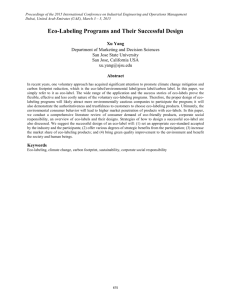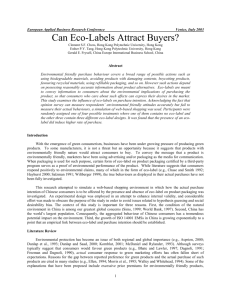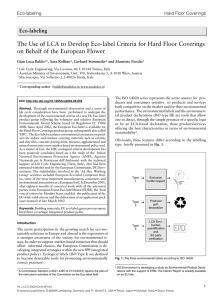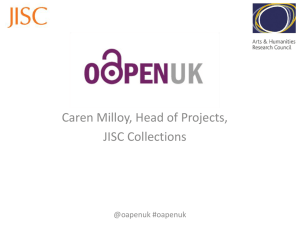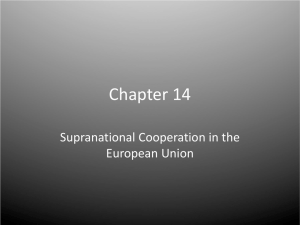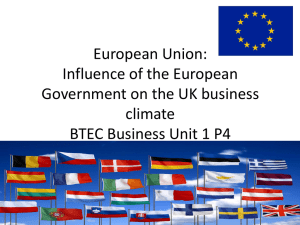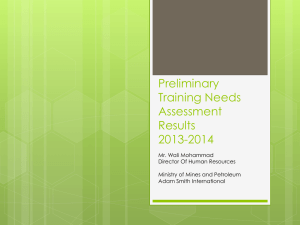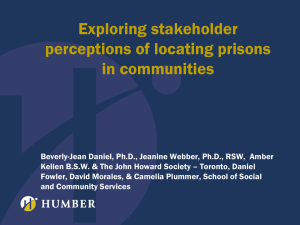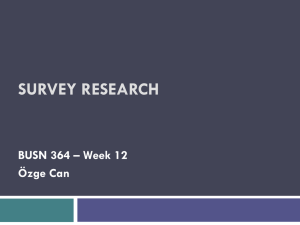Why ecolabelling is not so atractive in Romania
advertisement
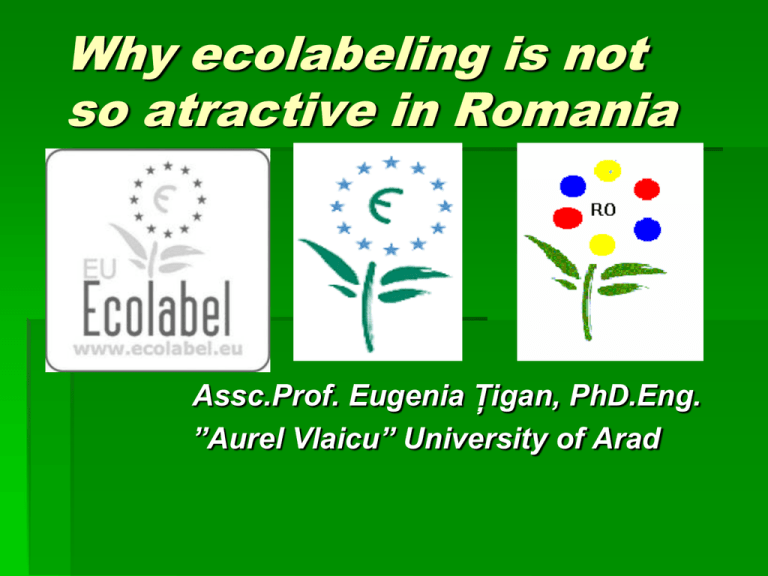
Why ecolabeling is not so atractive in Romania Assc.Prof. Eugenia Țigan, PhD.Eng. ”Aurel Vlaicu” University of Arad Ecolabeling is a voluntary scheme designed to encourage : traders to sell goods / services with reduced environmental impact European consumers - including public and private purchasers - to use products with reduced environmental impact And the eco-label can be easily identified these products and services Aim to a sustainable society Voluntary system that uses market forces Promote products with minimal impact environment and human health throughout their life cycle Stimulates Consumers and producers Are ecolabeled services /products Eco-label does not apply a) substances or preparations classified as very toxic, toxic, environmentally harmful, carcinogenic, toxic for reproduction or mutagenic, and goods manufactured by processes harmful to humans or the environment and can harm the consumer under normal conditions of use; b) food, beverages, pharmaceuticals; c) medical devices intended for professional or that is prescribed or used by When you first heard of eco-label majority of those surveyed had heard of eco-label for the first time 2-3 years ago they were in proportion of 41.9% followed by those who claim to have first heard of eco-label last year in proportion of 32.3% only 19.4% of those surveyed said they had heard of eco-label this year. 3.2% have heard from more than 5 years and 3.2% have not heard all of the eco-label How often do you meet with the notion of eco-label 41.9% say they rarely met, same percentage 41.9% felt that they rarely met the eco-label. Was frequently encountered by 3.2% of respondents, and 9.7% often met ecolabel In what areas have met ecolabeling primarily Most respondents, 67.7% claim to have met ecolabeling food, and 29% say that the shops In what areas have met ecolabelling in this sense that the majority 49.1% said they met first eco-label household products and 35.5% were found primarily in tourist services Do you appreciate ecolabelled products as Of those surveyed believe that a rate of 63.3% of ecolabeled products are of good quality, high quality 25% of respondents and 9.7% think that ecolabeled products are top quality. Do you consider that in the future ecolabeled products and services will be appreciated? In this regard 61.3% believe that ecolabeled products and services are increasingly popular in the future. Only a small proportion of respondents considered that 12.9% will be neither appreciated nor unappreciated. How important is it for you to drink / use ecolabelled products? is very important for 22.6% of consumers and for only 61.3% is important. Only 12.9% believe that the ecolabelled products are important. How frequently consume / use ecolabeled products ? When asked if consumed and how frequently consume ecolabeled products majority say rarely or infrequently only 3.2% of all respondents say that they consume these products often. The findings The analysis made on the importance of ecolabeling for consumer , that most of them learned about ecolabel 2-3 years ago but the concept of eco-label encountering rare or rare. A contradictory aspect is that, for respondents, it is important and very important to consume ecolabeled products , however they rarely or seldom purchase them. It should be noted that almost 40% of respondents have higher education, the others having finished high school, and most are aged between 24-30 years, although questionnaire responders people aged 18-58 years. The findings There is also balanced in terms of gender distribution of respondents Family income in the last month analyzing and assessing the respondents to these revenues, the income level is medium, appreciated the fact that the majority believes that they only are these essential income. Which may explain to some extent the interest of other products and not the organic label. Application fee in 66/2010 Reg.UE confirmed Minimum 200 euro Maximum 1200 euro for SMEs can not exceed 600 euro, micro not exceed 350 euro Discounts 20% for SMEs and applicants from developing countries or those who apply managenet system or apply ISO14001 environmental annual fee Maximum 1,500 euro per product group applied Not exceed 750 euros for SMEs and applicants from developing countries Not exceed 350 euros for micro In GD 661/2011 confirmed in Romania is not an annual fee, only the application fee of 200 euro Why is not attractive eco-label in Romania? - Suggestions and recommendations It can not be attractive what we do nott know ! It can not be attractive which cost are too high until the entry into force of the new GD 661/2011 Illustrate the benefits of eco-label application need for producers of goods and services. Promoting the advantages of eco-labeled for products consumer Awareness of the need to have a reduced environmental impact as through our lifestyle No. certificates awarded by each Member State data in 2010 COUNTRY LICENCES BULGARIA 0 POLAND 8 ICELAND 0 BELGIUM 9 LIECHTENSTEIN 0 PORTUGAL 13 LITHUANIA 0 CZECH REPUBLIC 14 LUXEMBOURG 0 NETHERLANDS 16 IRELAND 17 CYPRUS 1 ESTONIA 1 SWEDEN 21 MALTA 1 UNITED KINGDOM 22 SLOVAKIA 1 GREECE 23 LATVIA 3 SPAIN 45 ROMANIA 3 AUSTRIA 55 SLOVENIA 3 GERMANY 66 HUNGARY 4 DENMARK 72 NORWAY 7 FRANCE 148 FINLAND 8 ITALY 266 Hotel Saturn and Company Maguay Links: European Union Eco-label - http://ec.europa.eu Ministry of Environment - http://www.mmediu.ro Ministry of Environment - http://www.eco-label.com Ministry of Environment http://www.etichetaecologica.ro For more information : Eugenia Tigan eugeniatigan@gmail.com etigan@yahoo.com Thank you!
